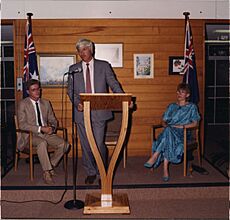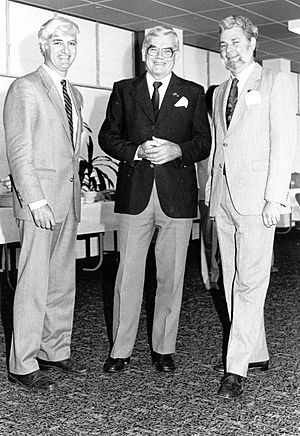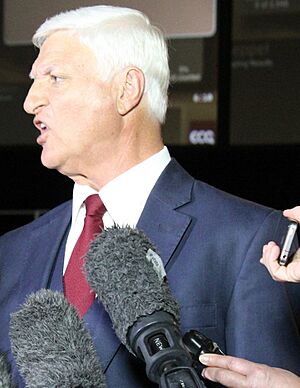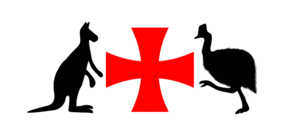Bob Katter facts for kids
Quick facts for kids
Bob Katter
|
|
|---|---|
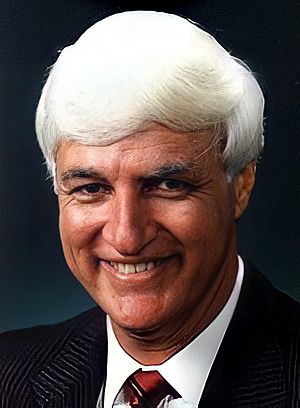
Official portrait, 1993
|
|
| Father of the House | |
| Assumed office 11 April 2022 |
|
| Preceded by | Kevin Andrews |
| Member of the Australian Parliament for Kennedy |
|
| Assumed office 13 March 1993 |
|
| Preceded by | Rob Hulls |
| Leader of the Katter's Australian Party | |
| In office 5 June 2011 – 3 February 2020 |
|
| Preceded by | Party established |
| Succeeded by | Robbie Katter |
| Member of the Queensland Parliament for Flinders |
|
| In office 7 December 1974 – 25 August 1992 |
|
| Preceded by | Bill Longeran |
| Succeeded by | Seat abolished |
| Minister for Northern Development, Community Services and Indigenous Affairs | |
| In office 7 November 1983 – 25 September 1989 |
|
| Premier | Joh Bjelke-Petersen Mike Ahern Russell Cooper |
| Preceded by | Thomas Gilmore |
| Succeeded by | Martin Tenni |
| Minister for Mines and Energy | |
| In office 25 September 1989 – 7 December 1989 |
|
| Premier | Russell Cooper |
| Preceded by | Martin Tenni |
| Succeeded by | Thomas Gilmore Tony McGrady |
| Personal details | |
| Born |
Robert Bellarmine Carl Katter
22 May 1945 Cloncurry, Queensland, Australia |
| Political party | Katter's Australian (since 2011) |
| Other political affiliations |
National (until 2001) Independent (2001–2011) |
| Relations | Carl Katter (half-brother) Alex Douglas (nephew) See Katter family |
| Children | Robbie |
| Parents | Bob Katter Sr. Mabel Horn |
| Residences | Charters Towers, Queensland |
| Education | Mount Carmel College St Columba Catholic College |
| Alma mater | University of Queensland |
| Occupation | Member of parliament Insurance, mining and cattle interests (self-employed) |
| Profession | politician |
| Military service | |
| Branch/service | Australian Army Reserve |
| Years of service | 1964–1972 |
| Rank | Second Lieutenant |
| Unit | 49th Battalion, Royal Queensland Regiment |
|
Other offices
1983–1989: Chair, National Party Water Resources Committee (Qld)
1968–1973: Delegate, National Party State Council 1972–1974: Branch President, National Country Party |
|
Robert Bellarmine Carl Katter (born 22 May 1945) is an Australian politician. He has served as a member of parliament (MP) for the Kennedy area in Queensland since 1993. Since 2022, he has held the title of Father of the House, which is given to the MP with the longest continuous service.
Katter was first a member of the National Party. In 2001, he left the party to become an independent politician. This means he did not belong to any political party. In 2011, he started his own party, called Katter's Australian Party.
His father, Bob Katter Sr., was also a politician. Katter's son, Robbie Katter, is a state politician in Queensland. This makes them a three-generation political family.
Early Life and Background
Bob Katter was born on 22 May 1945, in Cloncurry, Queensland. His father, Robert Cummin Katter, owned a clothing shop and managed a movie theater before becoming a politician. Katter's family has Lebanese roots. His grandfather, Carl Robert Katter, came to Australia from Bsharri, Lebanon, in 1898.
Katter grew up in Cloncurry and later attended Mount Carmel College in Charters Towers. He studied law at the University of Queensland but did not finish his degree. While at university, he served in the Australian Army Reserve. After his studies, he returned to Cloncurry to work in his family's businesses and as a laborer in the mines.
Political Career
Queensland State Politics (1974–1992)
Katter began his political career in Queensland's state government. In 1974, he was elected to the Legislative Assembly of Queensland for the Country Party (now the National Party). He represented the area of Flinders.
From 1983 to 1989, he served as a government minister under Premier Joh Bjelke-Petersen and his successors. A minister is a politician in charge of a specific government department. Katter held several roles, including Minister for Northern Development and Minister for Mines and Energy. His time as a minister ended when the National Party lost the state election in 1989.
Federal Politics (1993–Present)
In 1993, Katter was elected to the federal parliament, which is the national government of Australia. He won the seat of Division of Kennedy, the same area his father had represented.
For his first few years in federal politics, Katter was a member of the National Party. However, he often disagreed with his party's views on the economy and social issues.
Working as an Independent
In 2001, Katter left the National Party to become an independent MP. He was very popular in his electorate and was re-elected easily in 2001, 2004, 2007, and 2010.
After the 2010 election, no single party had enough votes to form a government. Katter and two other independent MPs had to decide which major party to support. Katter chose to support the Liberal/National Coalition.
Katter's Australian Party
On 5 June 2011, Katter started his own political party, Katter's Australian Party. He said the party would focus on supporting agriculture and farming.
In the elections that followed, Katter continued to win his seat of Kennedy. He won in 2013, 2016, 2019, 2022, and 2025. After the 2022 election, he became the Father of the Australian House of Representatives because he was the longest-serving member of parliament.
In July 2024, it was announced that a special portrait of Katter would be painted to hang in the Australian Parliament building.
Political Views
Katter is known for his strong opinions. He supports farmers and rural communities. He is against the privatisation (selling government-owned businesses to private companies) of public assets. He also supports government rules that help local industries.
Environment and Industry
Katter has spoken out about climate change but has different ideas on how to handle it. He supports using ethanol fuel, which is a type of fuel made from plants. He believes this can help reduce pollution. He is also known for protesting against imported foods, like bananas, to support Australian farmers.
Gun Laws
Katter has expressed disagreement with Australia's strict gun laws, which were introduced after a major incident in 1996.
Indigenous Australians
Katter has often spoken about issues affecting Aboriginal and Torres Strait Islander people. In the 1980s, as a state minister, he worked on procedures to improve the safety of Indigenous people in police custody.
He has opposed some ideas like voter identification laws, saying they could make it harder for people in remote communities to vote. In 2022, he said he did not support the Indigenous Voice to Parliament proposal in its form at the time, but believed Indigenous people should have a say in how they are represented.
North Queensland Statehood
Katter is a strong supporter of making North Queensland its own state, separate from the rest of Queensland. He believes this would help the region grow and better represent its people.
Family and Marriage
Katter holds traditional views on family and marriage. He voted against the law that allowed same-sex marriage in 2017. When asked about the topic, he famously said he was more focused on other issues affecting his region, such as crocodile attacks.
Personal Life
Katter sometimes identifies as an Aboriginal Australian. He has said that when he was young, he was accepted as a member of the Kalkadoon tribe in the Cloncurry area. He feels a strong connection to Aboriginal people and culture.
His son, Robbie Katter, is also a politician in the Queensland Parliament. He represents much of the same area his father once did.
In his free time, Katter is a fan of the North Queensland Cowboys rugby league team.
See also
- Politics of Queensland
- Political families of Australia


